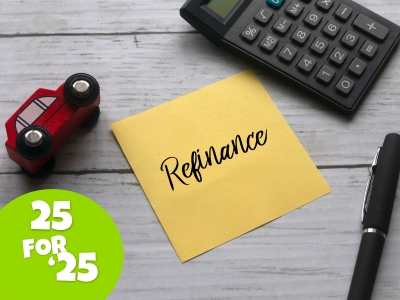25 Things To Know About Refinancing An Auto Loan
A loan refinance is the process of replacing an existing loan with a new one, typically from a different lender (or with modified terms from your current lender). The new loan pays off the old loan, and the borrower then repays the new loan under the updated conditions. In short, refinancing can be a powerful financial tool for borrowers looking to reduce costs, modify loan terms, achieve other financial goals, or simplify by moving all of their loans to one financial institution. Overall, refinancing could possibly help you reduce your loan costs, improve your payment structure, and provide financial flexibility...as long as the move is right for your unique financial situation.

Here are 25 things to consider:
Reasons to Refinance an Auto Loan:
- Lower Interest Rates: Refinancing can help secure a lower interest rate, reducing overall loan costs.
- Lower Monthly Payments: Refinancing may extend your loan term, which can reduce monthly payments.
- Improve Loan Terms: Refinancing can result in more favorable terms, such as a shorter loan term or better rates.
- Switch from a Variable to a Fixed Rate: Refinancing can allow you to switch from an adjustable-rate loan to a fixed-rate loan for stability.
- Access Better Lender Deals: You may find a lender offering more attractive terms than your original loan provider.
- Debt Consolidation: Refinancing may help consolidate multiple loans into a single, more manageable payment.
- Buy Out An Expiring Car Lease: By refinancing, you can transition from a lease to ownership, which means you'll no longer worry about mileage limits, wear-and-tear charges, or other restrictions or lease-end fees.
- Build Credit History: Refinancing could help improve your credit score by allowing you to pay off your current loan with better terms.
- Unlock Cash Flow: A lower monthly payment means more disposable income for other expenses or savings.
- Remove a Co-Signer: Refinancing can be a way to remove a co-signer from the loan if your credit has improved (or if your co-signer's credit has declined).
- Relieve Financial Stress: Refinancing can provide some financial relief if you're struggling with high monthly payments.
- Improve Loan Features: Refinancing can enable you to negotiate terms such as a deferred payment or a more flexible payment schedule.
- Take Advantage of Improved Credit Score: If your credit score has improved since taking out the original loan, refinancing can help you get better rates.
- Move All Your Loans To One Primary Financial Institution: Centralizing your loans at one financial institution makes it easy to access all your account information through a single online or mobile portal or account statement, saving you time when making your loan payments.
When is the best time to Refinance:
- When Interest Rates Drop: Refinancing is ideal when market interest rates have decreased since your original loan.
- After a Credit Score Improvement: If your credit score has increased significantly, you may be eligible for a better rate.
- At the End of a Promotional Loan Period: If you have a variable rate and your loan’s introductory rate period ends and the rate rises, refinancing can help you lock in a lower, stable rate.
- After Building Equity in Your Car: This is a financial strategy that can help you consolidate debt or pay for an unexpected expense. When the value of your auto exceeds the amount you owe on the auto loan, a cash-out equity refinance allows you to refinancing to a higher loan amount and receive the difference in cash. Essentially, you are borrowing against the equity in your vehicle.
- After a Major Life Change: Following a major financial event (e.g., promotion, tax refund, or inheritance), refinancing could help you adjust the loan to your new circumstances.
How to know if Refinancing is right for your situation:
- Current Loan Terms: If your current loan has a high interest rate or unfavorable terms, refinancing can improve your situation.
- Remaining Loan Balance: If you owe more than your car is worth, refinancing may not be a good option, as you might not get favorable terms.
- Total Loan Cost: Ensure the total cost of refinancing (including any fees) makes sense compared to your original loan. Sometimes, refinancing savings may not outweigh the fees.
- Consider The Impact To Your Overall Interest Costs: When you refinance, you may extend the term of the loan to reduce your monthly payments. However, while this might make your payments more manageable in the short term, a longer loan term means you may end up paying more in interest over the life of the loan, even if the interest rate is lower.
- Prepayment Penalties or Fees: Some auto loans include prepayment penalties* or fees if you pay off the loan early or refinance it. These charges can offset any savings you might have gained from a lower interest rate and make refinancing less beneficial.
- If It Will Negatively Impact on Your Credit Score: Refinancing can cause a temporary dip in your credit score. This happens because applying for a new loan results in a hard inquiry on your credit report, and closing the old loan may also lower your credit score due to changes in your credit utilization and account history. However, if you continue to make timely payments, your score may improve in the long run.
By understanding these factors, you can determine whether refinancing is a smart move based on your specific financial goals. Bringing your loan from another financial institution to 1st Community Credit Union could help you save time, money, and hassle.
If you're still not sure if refinancing is right for you, the friendly local lenders at 1st Community Credit Union are available to answer your questions and walk you through your options so you can make an informed decision knowing how a refinance could impact your financial health. Apply online to get pre-qualified, reach out to us with your questions or stop by 1st CCU during business hours in Sparta, West Salem, or Tomah.
*1st Community Credit Union does not charge prepayment penalties.
« Return to "Blog"



